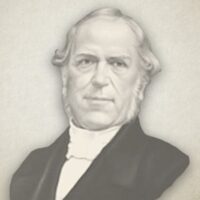
59 A Word To The Jewish Rulers
First, that in the words of our text, our Lord speaks to one class of people concerning another, even to the heads, rulers, and teachers, concerning the general inhabitants of Jerusalem, saying, ‘How often would I have gathered your children, and ye would not.’ And did ever one class of people hinder the eternal God from saving another class by his grace with an everlasting salvation? ‘Who would set the Mars and thorns against me in battle? I would go through them, I would burn them together,’ Isa 27:4. And where the eternal salvation of souls by the grace of God is the subject in hand, it is no where to be found, that God hath ever consulted one party of men about the salvation of another; ‘For who hath known the mind of the Lord, and who hath been his counselor?’ Rom 11:34. The Lord hath neither lost nor cast away any of his people whom he did foreknow, and so all Israel shall be saved,’ verse 26. Our Lord never said, either in our text or elsewhere, I would have taken you to heaven, but you would not go; nor, I would have saved you with an everlasting salvation, but you would not be saved; nor, I would have given you eternal life, but I could not get you to have it; nor in our text, I would have gathered you: but how often, by the prophets, from various corruptions of your covenant economy, and so from various foes, invaders, and calamities at different periods, and now at last by myself, as a city and nation, from storms of judgment and from the devouring eagle, the Romans, according to the conditions of your covenant, Ex 20, 21, 22, 23, 24:7,8, saying, ‘Turn ye again now every one from his evil way, and from the evil of your doings, and dwell in the land that the Lord hath given unto you and to your fathers for ever and ever,’ Jer. 25:5; 18:7,8, would I have gathered your children, under the wings of protection, and ye would not. Jesus as a Jewish Man and Prophet Second, that our Lord is not speaking ‘in our text on the subject of eternal salvation at all, nor *in the language of the ‘mighty to save,’ nor on the subject, ground or premises of his gift of eternal life; but in the simple speech and language of a minister of the word of that truth that regarded their constituted state as a nation and people, himself being of the seed of Abraham; and in which sense as a man and minister, ‘he came unto his own, and his own received him not,’ John 1:11; and in which sense also, as a man, he wept over Jerusalem, Luke 19:41, hungered, thirsted, and was weary as a man; and which was no denial to his personal dignity, as ‘the Lord from heaven,’ nor to the almighty power and fullness of saving grace in him by the everlasting covenant, whereby ‘it pleased the Father, that in him all fullness should dwell; ‘ but it was in due order of perfect accordance with the Jewish economy, first to be observed by him in his relation to them by the covenant of circumcision; and also as a proof that his manhood was the very same as the manhood of other men, Heb 2:14, sin only excepted, Heb 4:15: even as his servant Paul had his private feelings as a man, for ‘his kinsmen according to the flesh,’ Rom 9:3, and his official and public feelings as an apostle of the Lord, Acts 20:24.
John Foreman (1792-1872) was a Strict and Particular Baptist preacher. He was appointed the Pastor of Hill Street Chapel, Marylebone, serving this position for close to forty years.
JOHN FOREMAN'S LIFE AND MINISTRY
JOHN FOREMAN ON DUTY FAITH (COMPLETE)
JOHN FOREMAN'S BAPTISM AND COMMUNION CONSIDERED (COMPLETE)




